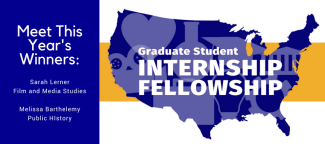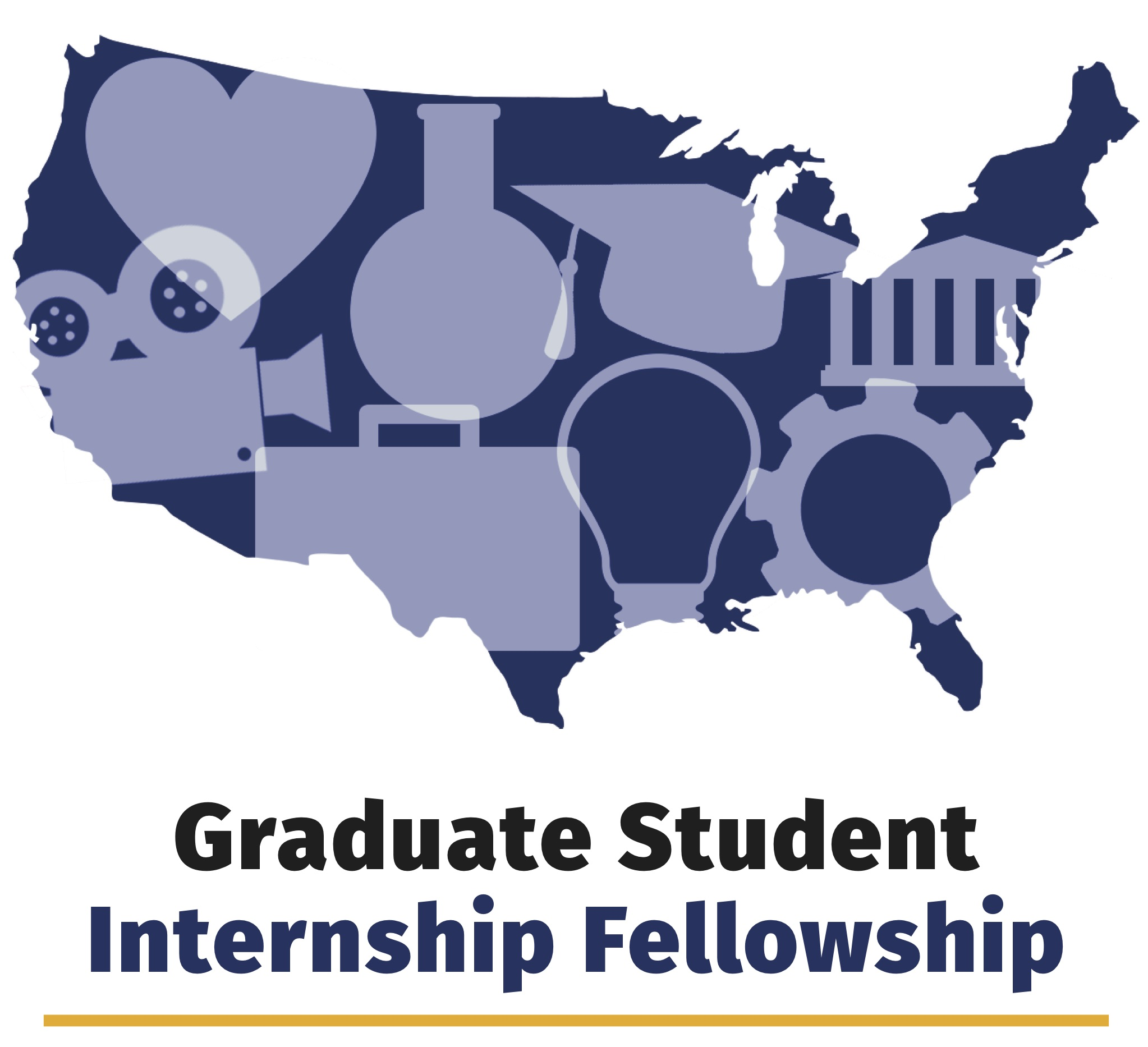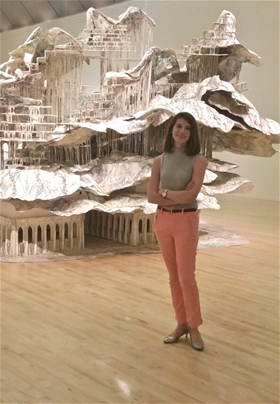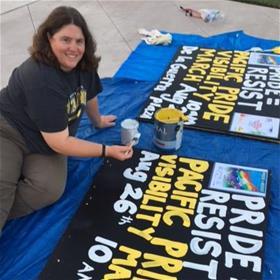Career & Tools
This past summer, Sarah Lerner and Melissa Barthelemy were each awarded the inaugural Graduate Student Internship Fellowships. They both had great experiences at their internships, and they have some valuable advice to share for students seeking this year's internship fellowship awards.

 Internships can unlock countless opportunities for graduate students to develop transferable skills that cannot be gained through their graduate studies but are nonetheless crucial to their career success. The UCSB Graduate Student Internship Fellowship assists graduate students with attaining experience related to career goals and professional development. This past summer, Sarah Lerner - a doctoral candidate in the Film and Media Studies Department - and Melissa Barthelemy - a doctoral candidate in the Public History Department - were each awarded the inaugural Graduate Student Internship Fellowships. Both Melissa and Sarah had great experiences at their internships, and they have some valuable advice to share for graduate students seeking this year's internship fellowship awards.
Internships can unlock countless opportunities for graduate students to develop transferable skills that cannot be gained through their graduate studies but are nonetheless crucial to their career success. The UCSB Graduate Student Internship Fellowship assists graduate students with attaining experience related to career goals and professional development. This past summer, Sarah Lerner - a doctoral candidate in the Film and Media Studies Department - and Melissa Barthelemy - a doctoral candidate in the Public History Department - were each awarded the inaugural Graduate Student Internship Fellowships. Both Melissa and Sarah had great experiences at their internships, and they have some valuable advice to share for graduate students seeking this year's internship fellowship awards.
How did your internship help you learn about working in a professional setting?
â
 Sarah: This summer, with the support of the Graduate Student Internship Fellowship, I worked at the San Jose Museum of Art for curator Rory Padeken. The experience was invaluable - it expanded my knowledge about curatorial practices and introduced me to new ways of engaging with the intersections between art and academic institutions. I learned about curatorial perspectives on a range of topics and concomitantly used skills I gained as a graduate student when I conducted research on exhibitions. My job challenged me to constantly consider how I approached my subject as well as the audience I was addressing. One of the most significant projects I undertook with respect to approach and audience included writing preparatory notes for gallery docents and later drafting gallery wall text for an exhibition on American lithography. The process made me acutely aware of how subtle variations in content, tone, depth, and scope alter the public's experience with the art on display. Curators like Padeken have an exemplary ability to make scholarship legible to different publics through many media and I aspire to develop and uphold this skill in my own work.
Sarah: This summer, with the support of the Graduate Student Internship Fellowship, I worked at the San Jose Museum of Art for curator Rory Padeken. The experience was invaluable - it expanded my knowledge about curatorial practices and introduced me to new ways of engaging with the intersections between art and academic institutions. I learned about curatorial perspectives on a range of topics and concomitantly used skills I gained as a graduate student when I conducted research on exhibitions. My job challenged me to constantly consider how I approached my subject as well as the audience I was addressing. One of the most significant projects I undertook with respect to approach and audience included writing preparatory notes for gallery docents and later drafting gallery wall text for an exhibition on American lithography. The process made me acutely aware of how subtle variations in content, tone, depth, and scope alter the public's experience with the art on display. Curators like Padeken have an exemplary ability to make scholarship legible to different publics through many media and I aspire to develop and uphold this skill in my own work.
 Melissa: This summer I served as an intern at the Pacific Pride Foundation, a 40-year-old local nonprofit organization that provides services to the HIV/AIDS and LGBTQ+ community of Santa Barbara. In this internship I was able to better understand many of the challenges that a small non-profit organization faces in terms of funding and labor. The necessity and value of creating relationships with community organizations and local businesses was also apparent. I was incredibly impressed by how much the organization does with such a small staff and with fewer resources than larger institutions I have worked for such as UC Santa Barbara and the City & County of San Francisco. One thing I discovered about myself in the process is that I would probably be more comfortable working in a larger institutional setting or in a larger nonprofit organization where there is more structure and more institutional resources.
Melissa: This summer I served as an intern at the Pacific Pride Foundation, a 40-year-old local nonprofit organization that provides services to the HIV/AIDS and LGBTQ+ community of Santa Barbara. In this internship I was able to better understand many of the challenges that a small non-profit organization faces in terms of funding and labor. The necessity and value of creating relationships with community organizations and local businesses was also apparent. I was incredibly impressed by how much the organization does with such a small staff and with fewer resources than larger institutions I have worked for such as UC Santa Barbara and the City & County of San Francisco. One thing I discovered about myself in the process is that I would probably be more comfortable working in a larger institutional setting or in a larger nonprofit organization where there is more structure and more institutional resources.
What advice do you have for other graduate students seeking internships?
Sarah: Some advice I have is to first become familiar with the workplace you would like to intern for. Incorporate your knowledge of the workplace into your job documents while also indicating your fit for the internship. Second, follow up on your application if you don't receive a response - a polite inquiry can go a long way.
Melissa: The advice I would give other graduate students seeking internships is to learn about the resources we have available on campus to help you find positions on campus and in the larger community. So often graduate students rely on advice from other graduate students in their home department, which can be helpful, but it can only take you so far. With Career Services and the Graduate Student Resource Center here at UCSB, there are staff and peer mentors who have expertise and are eager to assist you. Also, be thoughtful about where you consider interning and what your motivations and goals are. I have had a mixture of paid internships and internships that I have done as an unpaid volunteer, and it is important to remember that your time is extremely valuable and that you must be selective about what opportunities you seek out. If you can tie your internship to your professional goals, your academic work, and your personal interests it is a recipe for success and emotional well-being. In the current job market with fewer and fewer tenure-track positions available, I think it is more important now than ever before to "cross-train" by exploring a range of employment opportunities and building a wide network that extends beyond our campus and beyond your specific area of specialization.
We are excited to offer the Graduate Student Internship Fellowship again this academic year with the help of the Graduate Student Association. For more information, visit the Graduate Career Services Website or come to our information session on November 15 from 10:30-11 a.m in SRB Room 2154!